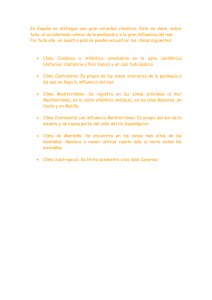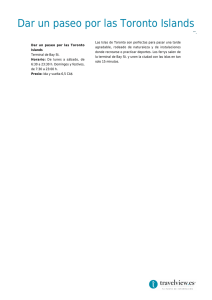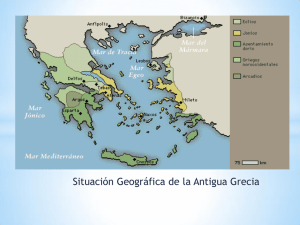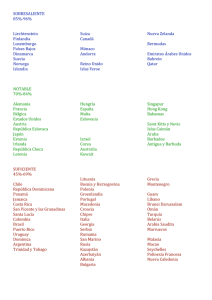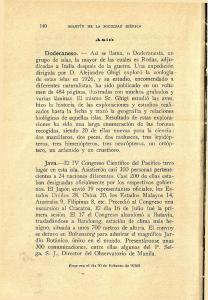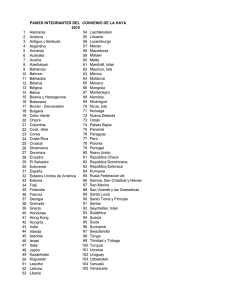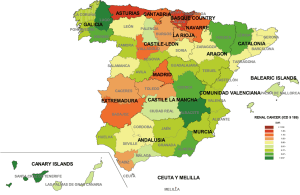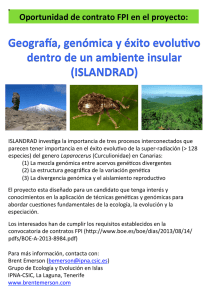Tríptico - Current Epigraphy
Anuncio
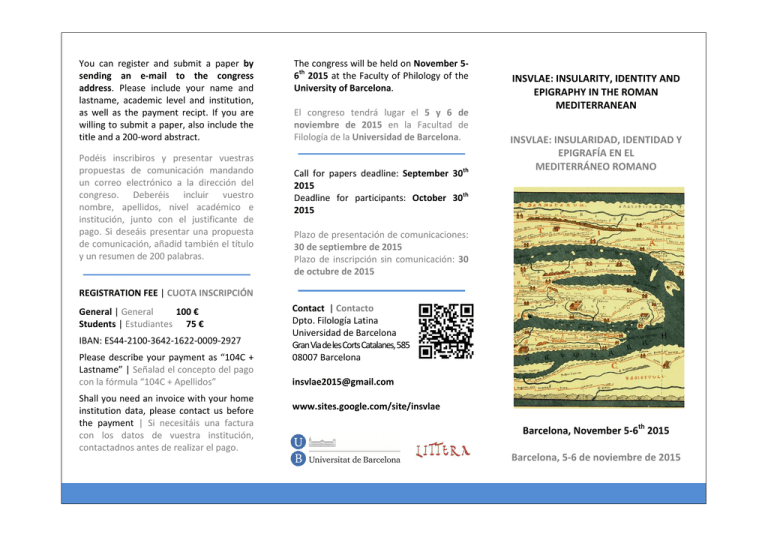
You can register and submit a paper by sending an e-mail to the congress address. Please include your name and lastname, academic level and institution, as well as the payment recipt. If you are willing to submit a paper, also include the title and a 200-word abstract. Podéis inscribiros y presentar vuestras propuestas de comunicación mandando un correo electrónico a la dirección del congreso. Deberéis incluir vuestro nombre, apellidos, nivel académico e institución, junto con el justificante de pago. Si deseáis presentar una propuesta de comunicación, añadid también el título y un resumen de 200 palabras. The congress will be held on November 56th 2015 at the Faculty of Philology of the University of Barcelona. El congreso tendrá lugar el 5 y 6 de noviembre de 2015 en la Facultad de Filología de la Universidad de Barcelona. Call for papers deadline: September 30th 2015 Deadline for participants: October 30th 2015 INSVLAE: INSULARITY, IDENTITY AND EPIGRAPHY IN THE ROMAN MEDITERRANEAN INSVLAE: INSULARIDAD, IDENTIDAD Y EPIGRAFÍA EN EL MEDITERRÁNEO ROMANO Plazo de presentación de comunicaciones: 30 de septiembre de 2015 Plazo de inscripción sin comunicación: 30 de octubre de 2015 REGISTRATION FEE | CUOTA INSCRIPCIÓN General | General 100 € Students | Estudiantes 75 € IBAN: ES44-2100-3642-1622-0009-2927 Please describe your payment as “104C + Lastname” | Señalad el concepto del pago con la fórmula “104C + Apellidos” Shall you need an invoice with your home institution data, please contact us before the payment | Si necesitáis una factura con los datos de vuestra institución, contactadnos antes de realizar el pago. Contact | Contacto Dpto. Filología Latina Universidad de Barcelona Gran Via de les Corts Catalanes, 585 08007 Barcelona insvlae2015@gmail.com www.sites.google.com/site/insvlae Barcelona, November 5-6th 2015 Barcelona, 5-6 de noviembre de 2015 The Mediterranean was the center of the Roman Empire, and thus the islands played a very important role, particularly in a civilization that was afraid of open-sea navegation. El Mediterráneo era el centro del Imperio Romano, y es por este motivo que las islas tenían un papel fundamental, sobre todo teniendo en cuenta que se trataba de una civilización con miedo a la navegación a mar abierto. This congress aims to study the particularities and similarities of the Mediterranean islands during the Roman Age, to analyze the possible consequences of isolation in each of them and the general features that typify them during that period in comparison with the continent. Este congreso pretende estudiar las particularidades y similitudes de las islas del Mediterráneo durante la época romana, analizar las posibles consecuencias derivadas del aislamiento en cadauna de ellas y los rasgos generales que las caracterizan durante este periodo en comparación con el área continental. The congress will be mainly focussing on the inscriptional sources, but the use of any other ones is also welcome. El congreso se centra sobre todo en las fuentes epigráficas, pero evidentmente también serán bienvenidos estudios basados en otras fuentes. During the congress, together with the papers presented by participants, five crosssubject lectures will be held, dealing with several topics related to islands and navegation. Durante el congreso, junto con las comunicaciones presentadas por los participantes, también se llevarán a cabo cuatro ponencias de carácter transversal y centradas en varias temáticas vinculadas con las islas y la navegación. LECTURES | PONENCIAS N. PURCELL– University of Oxford (United Kingdom) Roman empires and their insular contradictions Imperios romanos y sus contradicciones insulares A. MASTINO – Università di Sassari (Italy) R. ZUCCA – Università di Sassari (Italy) Insular identity Identidad insular V. GRIEB – Helmut-Schimidt - Universität der Bundeswehr Hamburg (Germany) Insulae and their impact on piracy in the Roman Mediterranean Las islas y su impacto en la piratería del mediterráneo romano F. OLIVEIRA – Universidade de Coimbra (Portugal) The islands in Pliny the Elder’s work Las islas en la obra de Plinio el Viejo M. MAYER – Universitat de Barcelona (Spain) Organization | Organización LITTERA Coordination | Coordinación Javier Velaza Frías Secretary | Secretaría Gemma Bernadó Ferrer Blanca Rodríguez Belló Silvia Tantimonaco Circulation of materials: the Balearian islands Circulación de materiales: las islas Baleares
